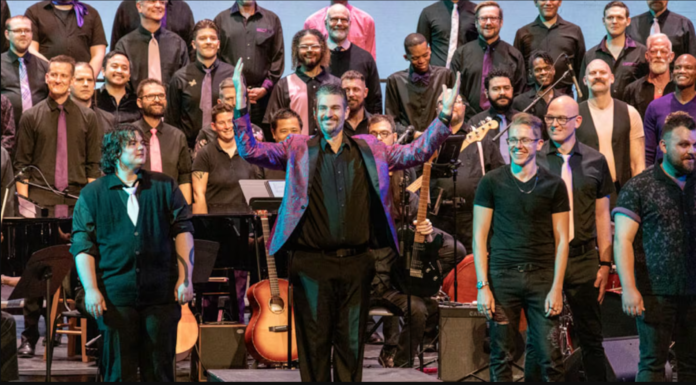
For Donald Milton III, the choral room is not just a space. It’s a sanctuary where he can fully express himself and forge meaningful connections through music.
As the artistic director of the Atlanta Gay Men’s Chorus, he is committed to using that transformative power to uplift the transgender community.
“Choir rooms are inherently queer spaces,” said Milton, who took the helm of the AGMC in 2018. “There’s a high level of acceptance and care that allows people to be themselves in a way that may not feel safe anywhere else.”
It’s a philosophy he’s carried with him since discovering the joy of singing in high school. Before then, Milton described himself as a “boring kid” — more interested in basketball and video games than artistic expression. But once he found his voice in the choir, everything changed.
“The choral space made me realize I could have emotions and express them freely around other people,” he said. “It wasn’t an individual space; it was a communal space.”
Inspired by that experience, Milton pursued a career in music education, determined to create those same kinds of welcoming environments for others. His expertise in working with adolescent changing voices has proved invaluable in his work with transgender singers, he said.

“It’s incredibly similar,” Milton said. “When teaching middle and high school groups, the voice changes are dramatic. The larynx can grow up to 200% in cisgender male adolescents. That’s what happens when trans men take testosterone.”
Milton encourages his transgender singers to embrace those vocal shifts, rather than trying to avoid them.
“The way to stop your voice from cracking is to let it crack 10,000 times,” he said. “You’re strengthening that muscle by letting it happen.”
“It’s about curiosity and letting your voice do what it does, instead of trying to make your voice do a thing,” he said. “Maybe a beautiful metaphor for life in general — you want life to be what it is, not what you’re trying to force it to be.”
In recent years, the AGMC has seen a growing number of transgender and nonbinary singers join its ranks. For Milton, it was a natural evolution and one he was eager to embrace and support.
“It happened organically,” he said. “Trans guys started joining the AGMC, and it was a beautiful compliment to the chorus that it had become a safe space for people to be themselves and sing.”
Rather than focusing on the challenges faced by the transgender community, Milton and the chorus decided to celebrate their stories and experiences. The result was “Transformations,” a concert performed earlier this year that wove together the personal narratives of the AGMC’s transgender members with joyful, affirming music.
“We didn’t want to talk about the plight of the trans community,” Milton said. “We wanted to celebrate what the AGMC has been celebrating for 44 years — the truth of queerness is beautiful, and people being themselves is beautiful.”
The concert struck a deep chord, not just with the AGMC’s transgender singers, but with the broader community as well. Milton said older gay men in the chorus expressed newfound understanding and support for trans and nonbinary people after the performance.
“Some were in tears and they said, ‘I didn’t get it, and now I do,’” Milton said. “To have that change happen in real time is really, deeply important.”
Milton is also grateful for the way he has been embraced by members of the AGMC. As a cisgender, straight male, he wasn’t sure if he’d be welcomed into the chorus’s predominantly LGBTQ+ community. His predecessor at the Unitarian Universalist Congregation of Atlanta, where Milton also works as the musical director, suggested he would be a good fit for the position.
“I went in, and it just felt so good,” he said of the audition process. “In the end, it just really works, and I feel privileged to be welcomed into the queer community in the way that I am.”
Milton will guide the AGMC through its 44th annual Holiday Concert on Dec. 20-21 at The Cathedral of St. Philip in Buckhead. The concerts are already sold out. Last year, the popular event attracted its largest crowd ever with 2,000 attendees.
“Music changed my life … and if I can do that for one other person, then that’s a life well lived,” he said. “Creating space for people to let music change them while they create beauty with other people — that’s so meaningful to me.”
